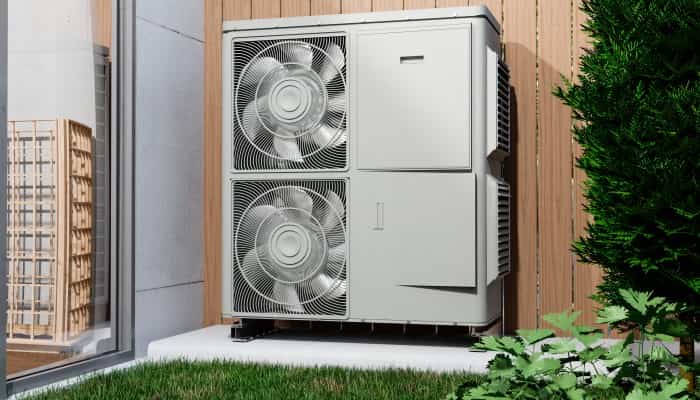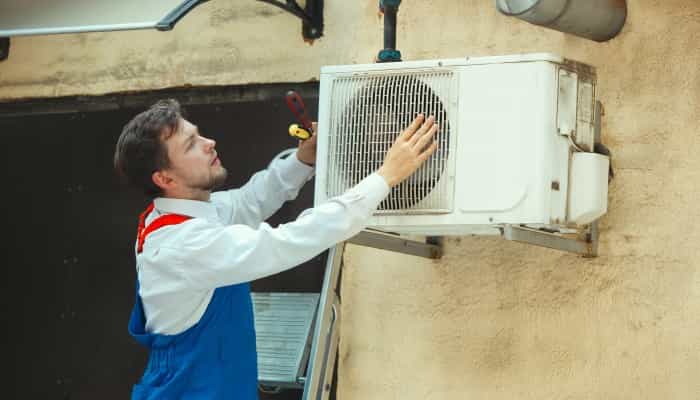Recently, homeowners are becoming more conscious about the environment especially with the climatic crisis and are seeking alternative ways to heat up their homes. Green and sustainable measures are now encouraged and eligible households can make upgrades to make their homes energy efficient.
A low-carbon heating solution is the air source heat pump. Read on as we take a look at heat pumps and air source heat pump pros and cons.
This is an energy efficient system that works by extracting heat from the air outside to provide heating and hot water for the home.
Its mode of operation is similar to a refrigerator but in reverse since it extracts thermal energy from the air outside and uses it to warm your home. Air is absorbed from the air by an evaporator which heats up the refrigerant gas at a low temperature. The gas is then compressed to increase the temperature and thereafter transferred into your central heating and hot water system to be used in your home.
In order to help eligible homes to be energy efficient, the UK government has sent up grants to subsidise the cost of installing an air source heat pump. There is also the Boiler Upgrade Scheme (BUS) under which the government is offering homeowners £5,000 towards the cost of replacing their existing heating system with low-carbon heating solutions.

Here are some of the benefits of an air source heat pump;
Installing an air source heat pump helps you to move away from the use of fossil fuel, such as gas, oil or LPG. Therefore, you will not need to pay for these fuels which means you will no longer have to pay gas bills. Air source heat pumps allow you to reduce your carbon footprint, heat your home more sustainably and efficiently, while also making savings on your utility bills.
Air source heat pumps are very efficient and its typical efficiency rating reaches 300%. This means that they maximise output by producing on average three units of energy for every unit of electricity it absorbs. Thus, for a UK home that uses 12,000 kWh per year for heating, your heat pump will provide enough heating from just 4,000 kWh of electricity.
This is far better than other heating systems such as electric boilers which have an efficiency rating of 100%, and gas boilers which can only reach 98% efficiency.
Air source heat pumps are not difficult to maintain. They are user-friendly and can be easily controlled. The installer sets up the system and the core parameters of the system. This reduces the interaction between the end-user and the controls. You will only need to adjust to your preferred room temperature via third-party controls which you can enable via an app
Wiping down the coils, replacing the filters every few months, removing any dirt from the internal fan blades, and cleaning the registers can help keep your heat pump in top condition. Additionally, ensure that items – such as grass, plants, twigs, and other foliage do not obstruct airflow to the air source heat pump.
An air source heat pump is a low-carbon heating system which is just great for the environment. They are in fact more environmentally friendly than gas and oil boilers.
Using data from the Energy Saving Trust and the government, a typical air source heat pump owner could cut their emissions by 70.5% per year if they switch from gas. oil boiler owners could by 80%.
Your air source heat pump system can last for at least 20 years as long as it is well installed. Remember that these appliances always need proper maintenance to remain in good condition. Therefore, the more you take care of your air source heat pump, the better it will serve you.
For most properties, solar energy may not be enough to fully power the heat pump. You would probably need more solar panels than what can be fitted on the roof. But here, you can partially power your heat pump with solar energy. This will help you to further reduce your heating system's carbon emissions, and this significantly reduces the running costs.

Having seen the benefits of a heat pump, let us briefly look at the cons of air source-
They are more expensive than gas boilers both in terms of initial set up costs as well as running costs. They run on electricity which is about three times more expensive than gas. However, thanks to their very high efficiency of over 300%, they are not actually three times more expensive.
It can be expensive to install costing an average of £10,000. However, you may be eligible for a heat pump grant and make the desired upgrades at a discounted price.
Heat pumps rely on electricity which isn’t always green.
The heat pump has to be installed on the outside wall of your property. Therefore, you need to have enough space around it so that that air can effectively be drawn into the unit.
It is not suitable for all properties. Statistics have shown that 54% of UK homes aren’t suitable for heat pumps. Before you can install an air source heat pump, your home needs to be insulated, it should have underfloor heating or large radiators, space to install the heat pump and interior space for the hot water cylinder.
There are many air source heat pump pros and cons- some of which have been highlighted in this guide. Heat pumps help you to reduce your carbon footprint and save money on utility bills. If they are too expensive for you to install, you can check if you are eligible for a UK government heat pump grant.
Reach out to us via our helplines for more information or fill out our contact form to get in touch with us.